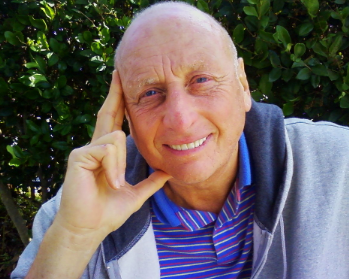 |
| Peter Copen, Founder of iEARN |
I have no doubt that people have and do refer to my hero, Peter Copen, as a gentle giant. I myself stand just about 6’4” and I remember my first meeting with Peter thinking, “For God’s sake, don’t make him mad.” Not likely. Peter Copen is a teacher, through and through. You can tell by the way he listens, by the patience and generosity in his manner. He’s one of those people you find yourself telling things – asking things - that you don’t ordinarily exchange with new acquaintances, but it’s so easy you can’t help yourself.
It’s a lot like iEARN, the international learning project he founded. It’s all about the exchange. The International Education and Resource Network is a global network of thousands of schools that exchange ideas and share learning experiences – collaboratively – in the classroom. Projects like The Art Miles Mural Project, Machinto, The Learning Circles, The MY HERO Project and dozens of others give students a chance to meet – a chance to learn with and about students from all over the world. And like conversing with iEARN’s founder, the exchange of ideas is often so enriching, so… entertaining, you just can’t help yourself.
Peter hails from Great Neck, Long Island, New York. He was educated at Tufts University and Boston University, “But my real education came from living Life itself and following my own interests.” Those interests, luckily for us, include helping young people and the planet, human behavior, philosophy, spirituality and education.
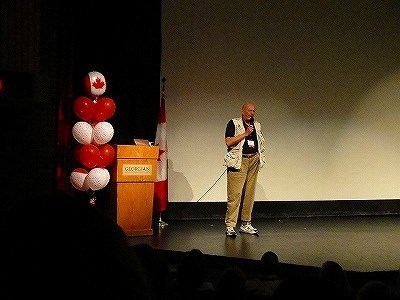 |
| Peter addresses the iEARN conference in Canada. |
His teaching career began when he co-created an alternative high school program called “Walkabout” with Eugene Lebwohl. It was a program built upon a belief in self-directed, experiential learning. “We discovered research that said that a learner retains 10% of what they read, 15% of what they hear, but 80% of what they experience.” Since 1977 Walkabout has offered bright but bored high school seniors an enriched learning experience designed to challenge them to, as Peter puts it, “go beyond their perceived limitations and learn that they can make a meaningful difference in their own lives and for others.”
Walkabout is built around a series of “challenges” that each student must overcome. The first challenge is Wilderness Survival: one week self-sufficiency hikes through the wilds of New York in the Fall and Spring. The second challenge is a four-week Community Service project and the third is Applied Academics, in which every subject answers the question, “how is this relevant and applicable to my life and career?” The fourth challenge is a 9-week Career Internship focusing on career skills, interviewing, effective communication and self assessment. A 20-minute Presentation to friends, family and community presents students with their fifth challenge. In it, students outline the things they’ve learned in preparing for life after school; a project Peter describes as “a moving and powerful experience to witness first hand.”
It’s been well over 30 years and Walkabout continues to graduate students from a program that’s been acknowledged as one of the top 40 experiential programs by the U.S. Department of Education. But awards and high rankings only serve to highlight the quality of an education that’s tied to the personal growth of a student. Ask Peter about the positive outcomes of the Walkabout school and his first response is “An enormous positive shift in self-esteem.”
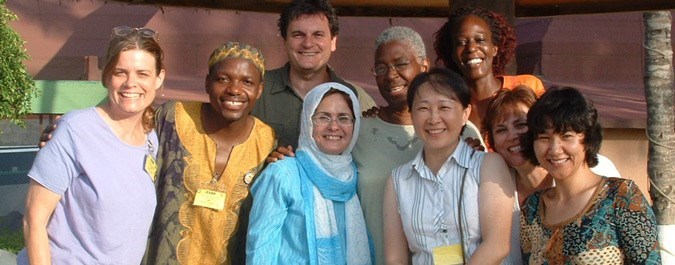 |
| The many faces of iEARN (www.iearn.org) |
“The students (at Walkabout) were my best teachers,” Peter says, “They taught me the power of a diverse community that learned together for a common goal. The goal was ‘you can do more than you think you can to make a meaningful difference in your life and in the world.” It’s a goal that Peter has pursued ever since.
In 1987 he left the Walkabout program to start The International Education and Resource Network, a project Peter describes as “an outgrowth of the Walkabout alternative high school program.” His vision for challenging students academically and personally in collaborative environments can tell you a lot about Peter as a teacher. But his reasons for starting iEARN are all about Peter, the man; Peter, the neighbor.
“iEARN was founded because of my fear of the potential for nuclear war between the Soviet Union and the United States. Scientists told us that if even 3% of the nuclear warheads were exploded that it would create a “nuclear winter” and horribly change life on our planet. This was insane to me. I was angry about it and I was driven to do anything I could to help prevent it. I felt that if people really knew each other, accepted their common humanity and learned to work together, that war would be impossible.”
To counteract the escalating tensions of the arms buildup between the two countries, Peter would wage an aggressive peace on the future.
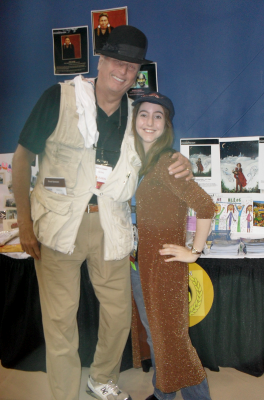 |
| Peter and Slater model each other's hats. |
“The first thing we did was to link 12 schools in Moscow with 12 schools in New York State in 1988. It was risky and difficult.” How difficult? “Many important people told us we were crazy and that it was impossible. This was the first time ever that schools in the former Soviet Union and the United States had connected in these ways.” But Peter would not be deterred… and neither would his counterparts in the Soviet Union. So Peter and his Soviet partners ventured bravely into the diplomatic void to create something that had been sorely lacking in the U.S. / Soviet discourse… real communication and ultimately, friendship. “Having learned from my Walkabout students that communication and a shared goal were the key to respect and understanding, we created communication options of electronic mail, video-speaker telephones, and student/teacher exchanges.” The result? A cultural exchange that affected everyone involved – not just as students and teachers, but as fellow human beings.
“The effect on me was enormous. I was moved by the teachers and students who felt the same need as I did to create human connections between our two countries -- connections across political and cultural boundaries -- to prevent war.” The connections ran deep, transcending the normal classroom interaction and entering an arena of self-discovery that perhaps even Peter hadn’t expected. Peter talks about one such experience. “(There was) a young, 16 year old Russian girl, at one of the schools I visited in Moscow in 1988. She was at a school assembly and the Principal said students could ask me any question they wanted – but it had to be about Math or Science (because of the political sensitivities between the USSR and the USA during the Cold War). However, she asked me the following question: “I want to speak to young people in the United States to find out more about my religion. You know, in our country, religion is outlawed. Can I do that?” I told her she could do that. The look on the faces of the school administrators was one of amazement. To me, the courage she demonstrated to speak what was in her heart and mind was the essence of what iEARN could offer to help young people in particular, and us all in general, to understand and respect each other as human beings sharing this fragile and beautiful planet.”
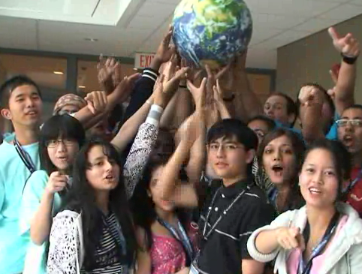 |
| Young people and the world. |
This is what iEARN is all about… learning about ourselves as we learn about each other, embracing our own beliefs by way of tolerance for another’s and ultimately surprising ourselves as we experience the kind of inner growth whose true colors come into full bloom when we reach out to strangers with kindness and curiosity and a willingness to learn.
During his time devoted to teaching, my hero has encountered many people he considers to be heroes; people who, in his words, "go beyond suffering and still have compassion to serve others in their life." But it's Peter's grandfather who stands out. "He was a Jew who was persecuted in Europe," Peter explains, "As a teenager, he escaped at the risk of his life. He had no money and could barely find food to eat and almost died. Somehow, he came to the United States and ended up working in sweatshops – 18 hours a day – to support his family in poverty. He gave my father the chance to succeed, which he did. And Dad gave me the opportunities that led to the founding of iEARN."
My hero still spends his time consulting with iEARN and facilitating its continued growth, but he reminds me that it’s a “bottom-up, not-for-profit organization,” and that “iEARN’s administration depends on volunteers, most of whom do it because it gives them meaning and satisfaction.” These are the people Peter mentions when he talks about his greatest source of pride… the teachers and the students he’s worked and grown with and the people who make iEARN happen, who keep his dream alive. And as dreams go, you won’t find many bigger. “To have billions of young people around the planet working together for a better world via the technology (that enables distant classrooms to learn together). In other words, to have young people globally have a powerful voice that will be paid attention to by the decision makers.”
Peter Copen is retired now, spending his days consulting with iEARN, involving himself in many philanthropic and creative projects and spending quality time with his family: 2 married sons who work in San Francisco, a married daughter in Matlock, UK and a daughter in El Salvador… a family that literally spans the globe. And maybe that’s not so surprising for a man who started a class without walls in a school without borders with the dream of enrolling the entire world.
Page created on 8/18/2014 7:12:38 PM
Last edited 1/6/2017 9:11:12 PM

MY HERO is proud to be a partner of this global learning community that links teachers and students around the globe. Peter Copen and his beautiful wife joined filmmakers, heroes, being honored at the 9th International MY HERO Film Festival held on November 23rd at USC School of Cinematic Arts.
As part of the Global Educator Award presentation to Peter Copen,Cheikh Seck, a teacher from Senegal shared his film covering the iEARN Conference of 2013 in Qatar. PEACE IN THE WORLD is a short film that highlights the importance of education to build a more peaceful world.